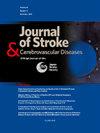Evaluating the strengths and limitations of structured modified rankin scale validation studies – A systematic review
IF 2
4区 医学
Q3 NEUROSCIENCES
Journal of Stroke & Cerebrovascular Diseases
Pub Date : 2025-02-06
DOI:10.1016/j.jstrokecerebrovasdis.2025.108242
引用次数: 0
Abstract
Background
Variations in performance of structured modified Rankin Scale (mRS) questionnaires in people with stroke within different cultural and language settings have not been systematically assessed. We systematically reviewed all studies of structured mRS questionnaires compared to in-person unstructured mRS evaluation scores.
Methods
We searched PubMed and Web of Science for studies that evaluated structured mRS questionnaires against in-person unstructured mRS evaluations among people with stroke. Studies were analyzed for country of investigation, mRS self-assessment modality, care setting (inpatient vs outpatient), concordance between structured and unstructured mRS scores, and risk of bias.
Results
We identified 13 structured mRS questionnaire validation studies across all continents except Africa. The telephone mRS questionnaire was most commonly used. Average time between unstructured and structured assessments was 14 days. The weighted kappa agreement between structured and in-person unstructured scores ranged from moderate to very good (Kw range: 0.56-0.90), though unweighted kappa scores were significantly lower (K range: 0.27-0.68). Discrepancies between structured and in-person unstructured scores tended to result from patients at the scale extremes. Patients with good mRS outcomes (mRS ≤2) tended to rate themselves better on structured questionnaires than their clinicians rated them on unstructured evaluations while those with poor outcomes (mRS ≥3) tended to rate themselves worse than their clinicians. Major limitations across studies included sampling bias in inpatient settings, time delays between in-person unstructured and structured mRS assessments, and differences in the formatting of unstructured mRS assessments.
Conclusion
While structured mRS questionnaire validation studies have generally displayed good agreement with in-person unstructured outcomes, significant discrepancies exist for patients with very poor and very good outcomes. Future studies should limit time between mRS assessments and better understand reasons for differences in structured and unstructured assessments. Further, data on validity of structured mRS tools are lacking from much of the world, especially Africa.
Primary Funding
1K01TW011771-01A1 (Saylor)
求助全文
约1分钟内获得全文
求助全文
来源期刊

Journal of Stroke & Cerebrovascular Diseases
Medicine-Surgery
CiteScore
5.00
自引率
4.00%
发文量
583
审稿时长
62 days
期刊介绍:
The Journal of Stroke & Cerebrovascular Diseases publishes original papers on basic and clinical science related to the fields of stroke and cerebrovascular diseases. The Journal also features review articles, controversies, methods and technical notes, selected case reports and other original articles of special nature. Its editorial mission is to focus on prevention and repair of cerebrovascular disease. Clinical papers emphasize medical and surgical aspects of stroke, clinical trials and design, epidemiology, stroke care delivery systems and outcomes, imaging sciences and rehabilitation of stroke. The Journal will be of special interest to specialists involved in caring for patients with cerebrovascular disease, including neurologists, neurosurgeons and cardiologists.
 求助内容:
求助内容: 应助结果提醒方式:
应助结果提醒方式:


